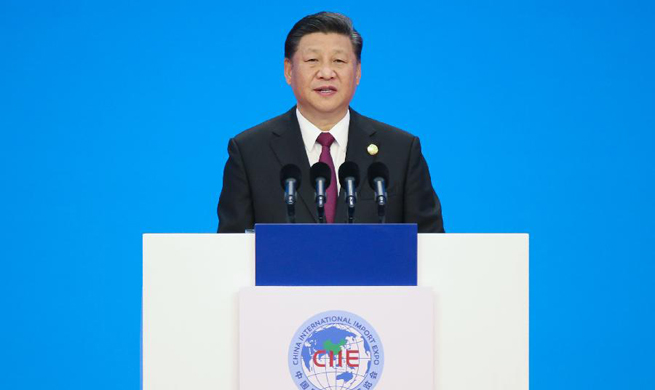BERLIN, Nov. 7 (Xinhua) -- The German Council of Economic Experts, comprised of five of the country's most respected academics in the field, sharply lowered its forecast for German economic growth in its annual growth report presented to the federal government on Wednesday.
The economists significantly lowered their forecast for gross domestic product (GDP) growth in Germany to 1.6 percent for 2018 and 1.5 percent for 2019 from earlier estimates of 2.3 percent and 1.8 percent.
The report was published shortly after several leading economic institutes and the German Central Bank (Bundesbank) similarly downgraded their outlook for the current and coming year.
"The German economy faces great challenges," the report warned.
The academics justified the more pessimistic prediction published on Wednesday with unfavorable framework conditions for global trade, as well as capacity bottlenecks due to a domestic shortage of skilled labor.
Established in 1963, the council is currently made up of RWI Leibniz Institute for Economic Research president Christoph Schmidt, University of Wuerzburg professor Peter Bofinger, University of Freiburg professor Lars Feld, University of Bonn professor Isabel Schnabel and Goethe University Frankfurt professor Volker Wieland.
Aside from making GDP forecasts, the report traditionally also includes concrete economic policy recommendations for the German government.
This year, the council urged the ruling "grand coalition" to accept the fact of intensifying international tax competition between states and completely abolish a controversial "solidarity surcharge" which generates around 20 billion euros (22.9 billion U.S. dollars) in fiscal revenue each year.
The solidarity surcharge is an additional fee charged by German tax authorities on capital gains, corporate and income taxes, and was first introduced in 1991 to help finance the country's re-unification.
Finance minister Olaf Scholz has recently announced that the surcharge will be abolished for 90 percent of taxpayers.
The council further expressed concern that the European Central Bank (ECB) could delay the normalization of interest rates in the eurozone for too long and called for an expansion of social housing construction in Germany.
"Rent controls only address the symptoms and do not lead to the desired result," the academic said about the government's present housing policy.
Speaking to Xinhua on Wednesday, Thiess Petersen, senior economics expert at the Bertelsmann Foundation, predicted that uncertainty stemming from international trade conflicts and domestic labor shortages would continue to weigh on German growth in the coming months.
As a result, Petersen also predicted the GDP expansion would be weaker than previously anticipated, at between 1.8 percent and 1.9 percent in 2018, and between 1.7 percent and 1.8 percent in 2019.
Petersen emphasized, however, that even these lower estimates were still reflective of "stable growth" in the eurozone's largest economy.













